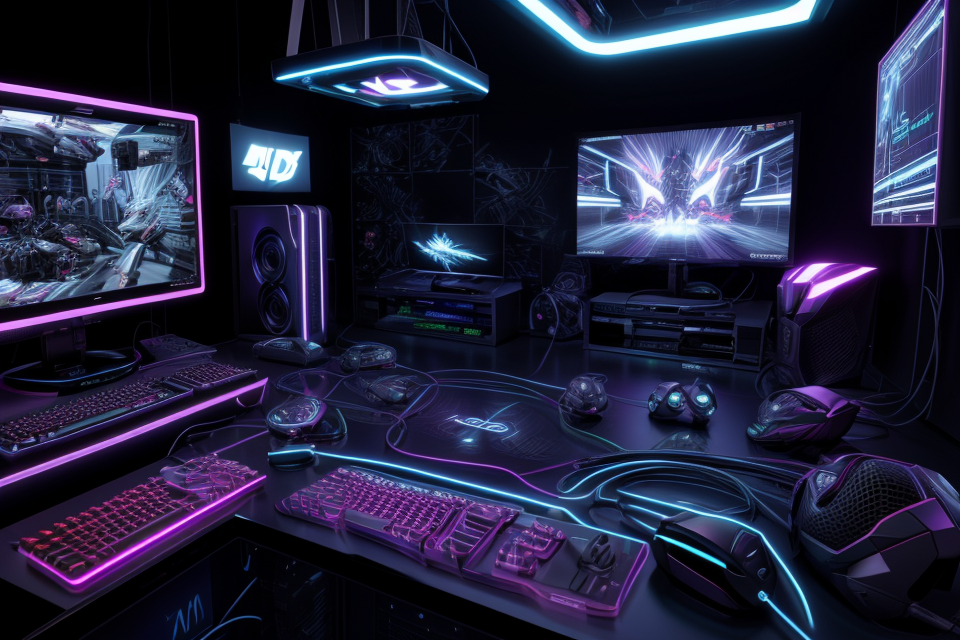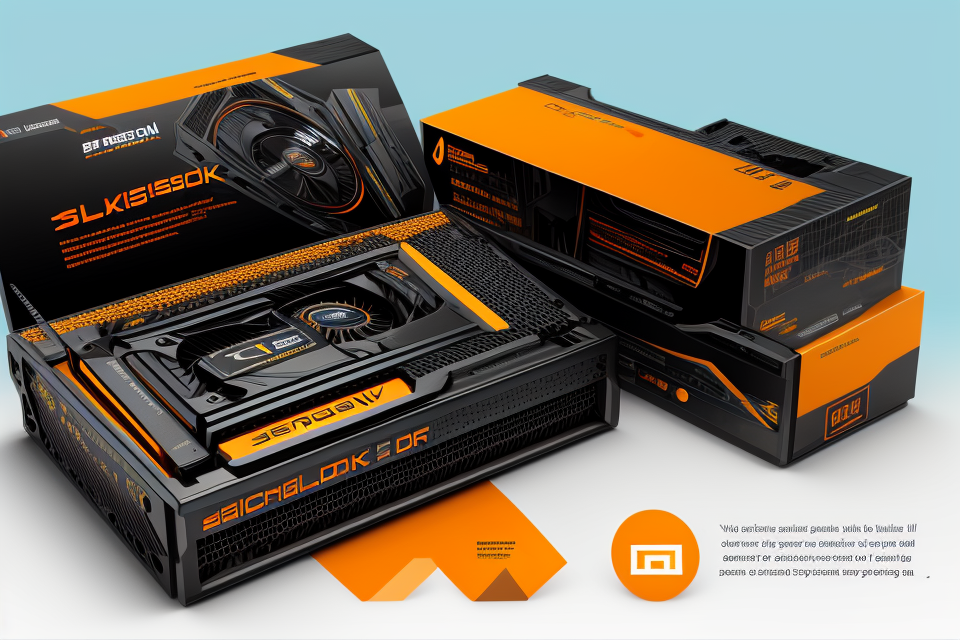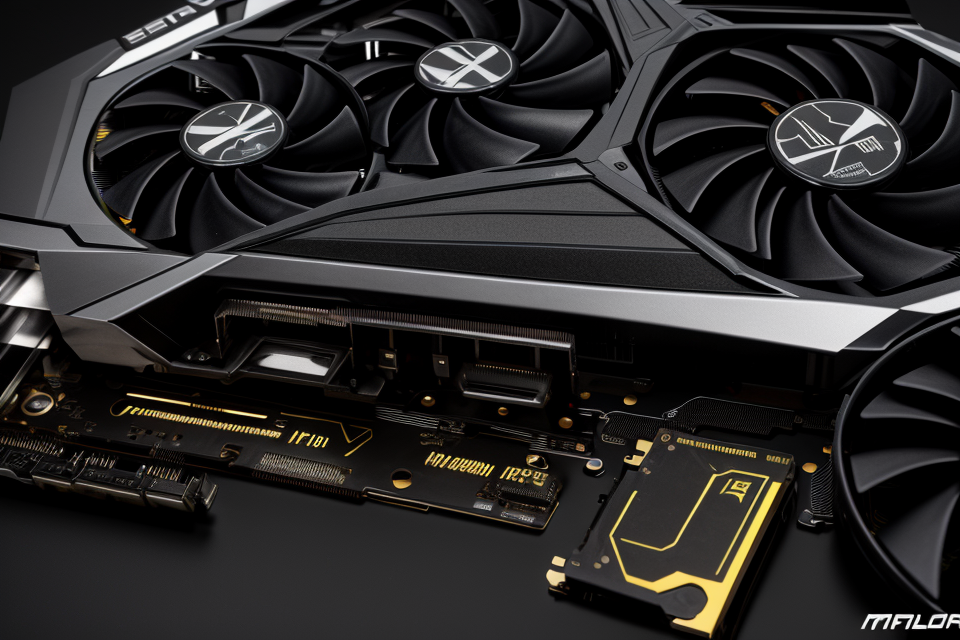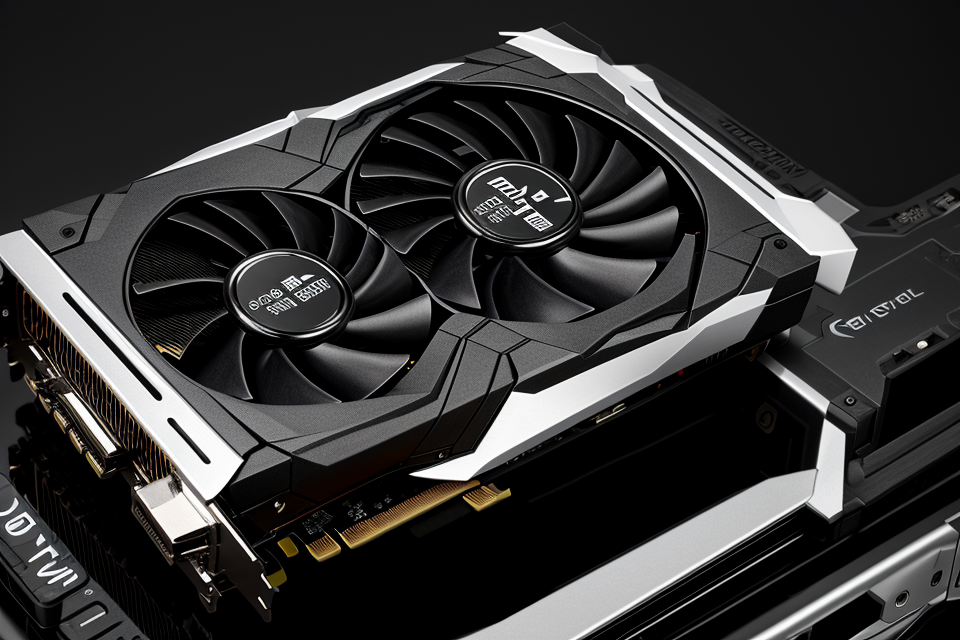
Gamers often debate the impact of graphics cards on gaming performance. Some claim that it’s the most crucial component in determining how well a game runs, while others argue that other factors such as the CPU and RAM are more important. But what’s the truth? In this article, we’ll explore the role of graphics cards in gaming and determine whether they really make a difference. We’ll look at the key features to consider when choosing a graphics card, and we’ll also discuss the limitations of relying solely on a powerful graphics card. So, get ready to discover the true impact of graphics cards on gaming performance!
What is a graphics card?
The role of graphics cards in gaming
Graphics cards, also known as GPUs (Graphics Processing Units), are specialized hardware components designed to handle the complex calculations required for rendering images and animations in real-time. They are a crucial component of any gaming PC, as they are responsible for producing the stunning visuals and smooth gameplay that gamers have come to expect.
The role of graphics cards in gaming is multifaceted. They are responsible for rendering 3D graphics, processing complex textures, and managing lighting effects. In addition, they are also used to accelerate other tasks such as video encoding and scientific simulations. However, the primary focus of graphics cards in gaming is to deliver high-quality visuals and a smooth gaming experience.
One of the key factors that determine the performance of a graphics card is its architecture. Different manufacturers use different architectures, and each has its own strengths and weaknesses. For example, NVIDIA’s GeForce architecture is known for its excellent performance in gaming, while AMD’s Radeon architecture is known for its superior performance in rendering.
Another important factor to consider when evaluating the performance of a graphics card is its memory. The amount of memory available on a graphics card can impact its ability to handle complex scenes and high-resolution textures. In addition, the speed of the memory can also affect performance, as it determines how quickly the card can access and process data.
Ultimately, the role of graphics cards in gaming is to provide a seamless and immersive visual experience. They are an essential component of any gaming PC, and their performance can have a significant impact on the overall gaming experience.
How graphics cards differ from integrated graphics
Integrated graphics are a type of graphics processing unit (GPU) that is built into the motherboard of a computer. They are designed to handle basic graphics processing tasks, such as displaying text and images on the screen. While integrated graphics are sufficient for basic computing tasks, they are not designed to handle the demands of modern gaming.
On the other hand, graphics cards are dedicated GPUs that are designed specifically for gaming. They are installed in the PCIe slot on the motherboard and have their own memory and processing power. Graphics cards are designed to handle the complex graphics processing required for modern games, including high-resolution textures, realistic lighting, and advanced animations.
One of the main differences between integrated graphics and graphics cards is their performance. Integrated graphics are typically slower and less powerful than graphics cards, which can result in lower frame rates and reduced gaming performance. Additionally, integrated graphics often have limited memory, which can result in lower image quality and lower resolutions.
Another difference between integrated graphics and graphics cards is their power consumption. Graphics cards require more power to operate, which can result in higher energy costs and the need for additional cooling. However, graphics cards also offer the ability to upgrade and improve gaming performance over time, making them a valuable investment for serious gamers.
In summary, graphics cards are designed specifically for gaming and offer improved performance and higher image quality compared to integrated graphics. While they require more power and may require additional cooling, they offer the ability to upgrade and improve gaming performance over time.
How graphics cards affect gaming performance
The importance of frames per second (FPS) in gaming
Frames per second (FPS) is a crucial metric in gaming that measures the smoothness and fluidity of the visual experience. It represents the number of individual images that are displayed per second on the screen. A higher FPS means that the game is rendering more images per second, resulting in a smoother and more responsive gaming experience.
The ideal FPS for gaming is subjective and depends on various factors such as the game’s genre, the hardware configuration, and the player’s preferences. However, most gamers agree that a higher FPS provides a more immersive and responsive gaming experience. A higher FPS also enables better visual quality, more detailed textures, and higher resolutions, resulting in a more cinematic and realistic gaming experience.
FPS is not only important for the overall visual experience but also for competitive gaming. In first-person shooter games, for example, a higher FPS can provide a significant advantage in aiming and reaction time, making it easier to hit targets and take down opponents. Therefore, having a powerful graphics card that can render high FPS is crucial for competitive gamers who seek to gain an edge over their opponents.
Overall, FPS is a critical metric in gaming that determines the smoothness and responsiveness of the visual experience. A higher FPS provides a more immersive and realistic gaming experience, and it is essential for competitive gamers who seek to gain an advantage over their opponents.
The impact of graphics cards on FPS
- Frames per second (FPS) is a crucial metric in gaming that measures the smoothness and fluidity of the visual experience.
- The performance of a graphics card has a direct impact on the FPS, as it is responsible for rendering the visuals in real-time.
- A higher-end graphics card with more powerful hardware and better cooling can render more frames per second, resulting in a smoother and more responsive gaming experience.
- The graphics card’s memory and bandwidth also play a role in determining the FPS, as they impact the card’s ability to handle complex visuals and textures.
- In summary, the graphics card plays a crucial role in determining the FPS of a game, and a higher-end card with better hardware and cooling can lead to a more responsive and visually impressive gaming experience.
Factors to consider when choosing a graphics card
Budget
When it comes to choosing a graphics card, one of the most important factors to consider is the budget. A graphics card can be a significant investment, and it’s important to find one that fits within your budget while still providing the performance you need for your gaming needs.
There are a wide range of graphics cards available at different price points, from entry-level cards that offer basic performance to high-end cards that offer top-of-the-line performance. It’s important to consider your budget and the amount you’re willing to spend when choosing a graphics card.
When setting your budget, it’s important to keep in mind that a higher-end graphics card will typically offer better performance than a lower-end card, but it will also come with a higher price tag. It’s important to weigh the benefits of a higher-end card against the cost, and determine if the extra investment is worth it for your specific gaming needs.
Additionally, it’s important to keep in mind that the price of a graphics card can fluctuate based on a variety of factors, including availability and market demand. It’s a good idea to do some research and compare prices from different retailers to ensure you’re getting the best deal possible.
Overall, when considering your budget for a graphics card, it’s important to find a balance between performance and cost. Determine what your budget is, and look for a graphics card that offers the best performance within that price range.
Game requirements
When selecting a graphics card, it is crucial to consider the specific requirements of the games you intend to play. Each game has its own set of hardware requirements, which include the graphics memory, clock speed, and processing power. These requirements may vary depending on the level of detail and complexity of the game.
To determine the appropriate graphics card for your gaming needs, it is important to research the specifications of the games you play. You can find this information by visiting the game’s official website or by searching online for reviews and benchmarks. This research will help you determine the minimum and recommended specifications for the games you play, allowing you to choose a graphics card that meets or exceeds these requirements.
It is also important to consider the future compatibility of the graphics card with upcoming games. As games become more advanced and demanding, the hardware requirements may increase, and a graphics card that meets the requirements today may not be sufficient in the future. Therefore, it is essential to choose a graphics card that is future-proof and can handle the demands of upcoming games.
Overall, considering the game requirements when selecting a graphics card is crucial to ensure optimal gaming performance and to avoid any compatibility issues or limitations.
Future-proofing
When choosing a graphics card, it’s important to consider how well it will perform in the future. Future-proofing is a key factor to consider because technology is constantly evolving, and you want to ensure that your graphics card will be able to handle the latest games and applications. Here are some key points to keep in mind when considering future-proofing:
- Check for compatibility: Make sure that the graphics card you choose is compatible with your current and future systems. This is especially important if you plan to upgrade your CPU or motherboard in the future.
- Consider the future of gaming: The latest games are becoming more demanding, with higher resolutions, better textures, and more complex gameplay mechanics. Choose a graphics card that can handle these demands, even if you don’t need it now.
- Consider other factors: While a graphics card is a crucial component for gaming, it’s not the only factor that affects performance. Make sure to consider other components, such as CPU, RAM, and storage, when building or upgrading your gaming system.
- Consider your budget: Future-proofing can be expensive, so it’s important to balance your budget with your future needs. Choose a graphics card that fits your budget but still meets your future-proofing requirements.
Compatibility with other components
When choosing a graphics card, it is crucial to consider its compatibility with other components in the gaming system. This is because a graphics card’s performance is heavily influenced by the other components it works with.
Some of the key components that need to be compatible with the graphics card include the motherboard, CPU, power supply, and cooling system. It is essential to ensure that these components are compatible with the graphics card’s form factor, power requirements, and interface.
For instance, the graphics card’s form factor should fit into the available expansion slot on the motherboard. The power supply should also be capable of providing sufficient power to the graphics card, and the cooling system should be adequate to prevent overheating.
It is also important to consider the motherboard’s chipset and the graphics card’s driver compatibility. The chipset determines the type of graphics card that can be used, and the driver compatibility ensures that the graphics card can work optimally with the system’s other components.
In summary, compatibility with other components is a critical factor to consider when choosing a graphics card. Ensuring that all components are compatible can help prevent issues such as instability, overheating, and reduced performance.
Noise level and cooling
When choosing a graphics card, one of the essential factors to consider is the noise level and cooling system. A graphics card with an effective cooling system will ensure that the card runs smoothly without overheating, which can cause significant performance issues. Here are some aspects to consider when evaluating the noise level and cooling system of a graphics card:
- Fan design and configuration: The design and configuration of the fan can significantly impact the noise level of the graphics card. A well-designed fan with a good balance between airflow and noise reduction can make a significant difference in the overall experience. Additionally, some graphics cards come with multiple fans, which can help distribute heat more effectively and reduce noise levels.
- Fan control and customization: Some graphics cards allow for fan control and customization through software, which can help fine-tune the fan speed and noise level according to the user’s preferences. This feature can be particularly useful for users who want to prioritize either performance or quiet operation.
- Thermal solution: The thermal solution, which includes the heatsink and thermal pads, plays a crucial role in dissipating heat generated by the graphics card. A high-quality thermal solution can improve the card’s thermal efficiency, resulting in better performance and a quieter operation.
- Airflow and case configuration: The airflow in the computer case can also impact the noise level of the graphics card. Ensuring proper airflow around the graphics card and throughout the case can help keep the card cooler and reduce noise.
- Power consumption and thermals: A graphics card with lower power consumption may generate less heat, which can lead to better performance and a quieter operation. Some high-performance graphics cards may consume more power, which can result in higher temperatures and potentially require more effective cooling solutions.
By considering these factors, you can choose a graphics card that not only performs well but also operates quietly and efficiently.
Common myths and misconceptions about graphics cards
Myth: High-end graphics cards are always necessary
One common myth about graphics cards is that high-end models are always necessary for optimal gaming performance. While it is true that high-end graphics cards can provide superior performance, they are not always necessary, especially if you are playing less demanding games or running your system at lower resolutions.
In fact, the performance benefits of high-end graphics cards may be more noticeable in games with advanced graphics and visual effects, as well as in games that are played at higher resolutions and frame rates. Additionally, the price of high-end graphics cards can be quite steep, which may not be justified for some gamers who do not require the highest levels of performance.
That being said, it is important to note that high-end graphics cards can still offer significant benefits for gaming performance, particularly for those who prioritize smooth gameplay and immersive visuals. However, it is important to assess your individual needs and budget before making a decision on whether or not to invest in a high-end graphics card.
Myth: Upgrading the graphics card will always result in a significant improvement
Upgrading the graphics card is often considered the holy grail of gaming performance improvements. Many gamers believe that swapping out their old graphics card for a newer, more powerful model will result in a substantial boost in frame rates and overall gaming experience. While it’s true that upgrading your graphics card can lead to improved performance, the extent of this improvement varies depending on several factors.
Firstly, the age of the existing graphics card plays a significant role in determining the impact of an upgrade. An older graphics card, especially one that is several generations behind the current state-of-the-art, will see a much more significant improvement than a newer model that is only a year or two old. This is because newer graphics cards are designed to be more energy efficient and are often optimized for specific games and software, making them less likely to provide a dramatic improvement in performance.
Secondly, the specific game or application being used also affects the impact of an upgrade. Some games are more graphics-intensive than others, and therefore may not see as much of a performance boost from a new graphics card as a less demanding game would. Additionally, certain applications may not be optimized to take full advantage of the additional power provided by a newer graphics card, leading to minimal performance gains.
Finally, the rest of the computer’s hardware must also be taken into consideration when assessing the impact of a graphics card upgrade. A high-end graphics card may be paired with a less powerful CPU or insufficient amount of RAM, which could limit the performance gains that can be achieved. It’s important to ensure that all components are working together in harmony for optimal performance.
In conclusion, while upgrading the graphics card can lead to improved gaming performance, the extent of this improvement depends on several factors, including the age of the existing card, the specific game or application being used, and the overall hardware configuration of the computer.
Myth: Integrated graphics are always sufficient for basic gaming
When it comes to gaming, many people believe that integrated graphics are always sufficient for basic gaming. While it is true that integrated graphics can handle basic games, they may not provide the best gaming experience for more demanding games.
Integrated graphics are built into the CPU and share the memory with the CPU, which can lead to slower performance compared to dedicated graphics cards. In addition, integrated graphics may not have the same level of performance as dedicated graphics cards, which can impact the quality of the game’s visuals and overall performance.
It is important to note that the suitability of integrated graphics for gaming depends on the specific game and the hardware configuration. For example, integrated graphics may be sufficient for older or less demanding games, but may not be able to handle more modern or graphics-intensive games.
Therefore, it is important to consider the specific needs of the game and the hardware configuration when deciding whether to use integrated graphics or a dedicated graphics card for gaming.
Recap of key points
- Upgrading to a high-end graphics card does not always guarantee a significant improvement in gaming performance.
- The compatibility of the graphics card with the game and the system is crucial for optimal performance.
- Overclocking a graphics card can improve performance but can also lead to instability and reduced lifespan.
- The price of a graphics card does not always correspond to its performance, as other factors such as the CPU and system architecture play a significant role.
- In some cases, upgrading other components such as the CPU or memory may have a more significant impact on gaming performance than upgrading the graphics card.
Final thoughts on the impact of graphics cards on gaming performance
- The role of graphics cards in gaming performance cannot be overstated. They are a critical component in determining the quality and smoothness of visuals in games.
- However, it is important to note that graphics cards are not the only factor that affects gaming performance. Other factors such as CPU, RAM, and the game’s optimization also play a significant role.
- It is also important to note that the impact of a graphics card on gaming performance may vary depending on the specific game and its requirements. Some games may be more demanding of graphics cards than others, and some may not show a significant improvement even with a high-end graphics card.
- In conclusion, while graphics cards are a crucial component in gaming performance, it is important to consider all factors that can affect gaming performance and to make informed decisions when choosing hardware.
FAQs
1. What is a graphics card and why is it important for gaming?
A graphics card, also known as a GPU (Graphics Processing Unit), is a component in a computer that is responsible for rendering images and videos. In gaming, a powerful graphics card can make a significant difference in the performance and visual quality of the game. A high-end graphics card can handle more complex graphics and render them at higher resolutions, resulting in smoother gameplay and more realistic visuals.
2. Can a low-end graphics card be used for gaming?
While a low-end graphics card may be sufficient for basic gaming, it may not be able to handle more demanding games or games with high graphics settings. If you are looking to play games with high graphics quality and smooth gameplay, it is recommended to invest in a mid-range or high-end graphics card.
3. How does the graphics card affect gaming performance?
The graphics card can have a significant impact on gaming performance. It can affect the frame rate, which is the number of frames per second (FPS) that the game can render. A higher frame rate results in smoother gameplay and a more responsive experience. Additionally, a powerful graphics card can enable higher resolutions, better textures, and more advanced lighting effects, resulting in a more immersive and visually appealing gaming experience.
4. How do I choose the right graphics card for my gaming needs?
Choosing the right graphics card for your gaming needs depends on several factors, including the type of games you play, the graphics settings you use, and the resolution of your monitor. It is recommended to research the minimum and recommended system requirements for the games you want to play and compare the performance of different graphics cards based on those requirements. Additionally, consider the budget and power consumption of the graphics card, as well as any additional features such as memory and cooling.
5. Can a graphics card improve the performance of an older computer?
A graphics card can certainly improve the performance of an older computer for gaming, but the extent to which it will improve performance depends on several factors, including the age and specifications of the computer, the type of games you play, and the graphics card you choose. In general, a newer graphics card with better performance will provide a significant boost to gaming performance, but other components such as the CPU and RAM may also need to be upgraded to achieve optimal performance.


